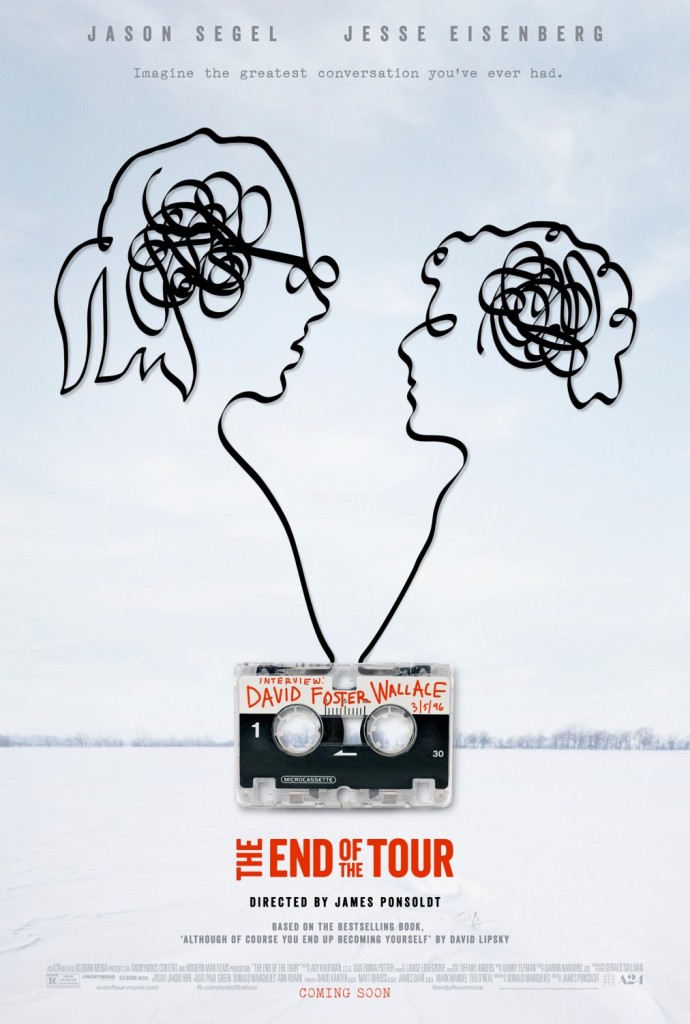Movie Breakdown: The End Of The Tour (Noah)
The Impression:
I have to say that a film about a 6-day interview between David Foster Wallace and David Lipsky does peak my interest. But I also spent four months reading Infinite Jest. So, my level of non-bias prediction is probably low.
The Reality:
James Ponsoldt isn’t a man that wants his movies to hurry. He made The Spectacular Now and Smashed, two slow, even pensive documentations of deeply flawed relationships. Both of them are beautiful, strangely engrossing films, but neither would be, by anyone but a cine-sloth, referred to as pulsing with energy. No sir. These are films about the slow, natural rhythms of life, and Ponsoldt has no problem with just putting that out there. Thus, The End of the Tour, a feature film recreation of the six-day interview between Infinite Jest author David Foster Wallace (Jason Segal – and yes, you can believe the hype) and Rolling Stone writer David Lipsky (Jesse Eisenberg), is a perfect sort of film for him. Don’t go into this thinking with a traditional narrative mind. It doesn’t have big moments, it doesn’t have a sneaky reveals, it doesn’t have romance or explosions or a blatant 5-act arc to lull our media saturated brains into silence. No. It’s really, honestly, just a beautifully shot film about two writers learning to know and enjoy each other’s company. At least on the surface. The six-day trip that followed the end of DFW’s Infinite Jest book tour certainly illuminates what was a seminal friendship for Lipsky and it certainly gives free reign for Ponsoldt and Segal to let the brilliant brain of DFW out on to the screen (his speech about shyness and using his significant others was a particular favorite of mine). But what got me, what continues to linger in my brain, is the just-below-the-surface study of the interplay between writer and subject, interviewer and interviewee; the way as a journalist, our interactions with, well, everyone are tainted by this insatiable, at times horrible, curiosity. Lipsky and DFW in the film are, ostensibly, friends (or people who enjoy each other at the least) but the power dynamic between them exists just below the surface, spurned on by DFW’s constant acknowledgement of said power dynamic. The moments in the film that pop (and, purposefully, there aren’t a lot) do so because Ponsoldt lets this idea stagnate between them, entangling them in the structure of friendship, before pulling the carpet out from under them, exposing what really lies below. Ponsoldt never staggers into melodrama, or barely drama, but the way he manages to craft this relationship between two people on opposite sides of so many creative spectrums is fantastic. There’s a real comfort to the film. Ponsoldt uses the tropes of a road-trip film – nasty car, ladies, diners, etc. – but by placing two brilliant minds within them, it lowers the dislike of quotable smart people, and makes the audience a willing tag-a-long. This is a film I could sit and dissect for hours, or, and this is because of the charm of the cast and the direction, a film I could just have rolling in the background, a companion, a hirsute friend who likes to chat.
The Lesson:
In the words of my friend David Gardner, “Jesse Eisensberg looks uncomfortable doing everything, but he looks especially uncomfortable smoking a cigarette.”



